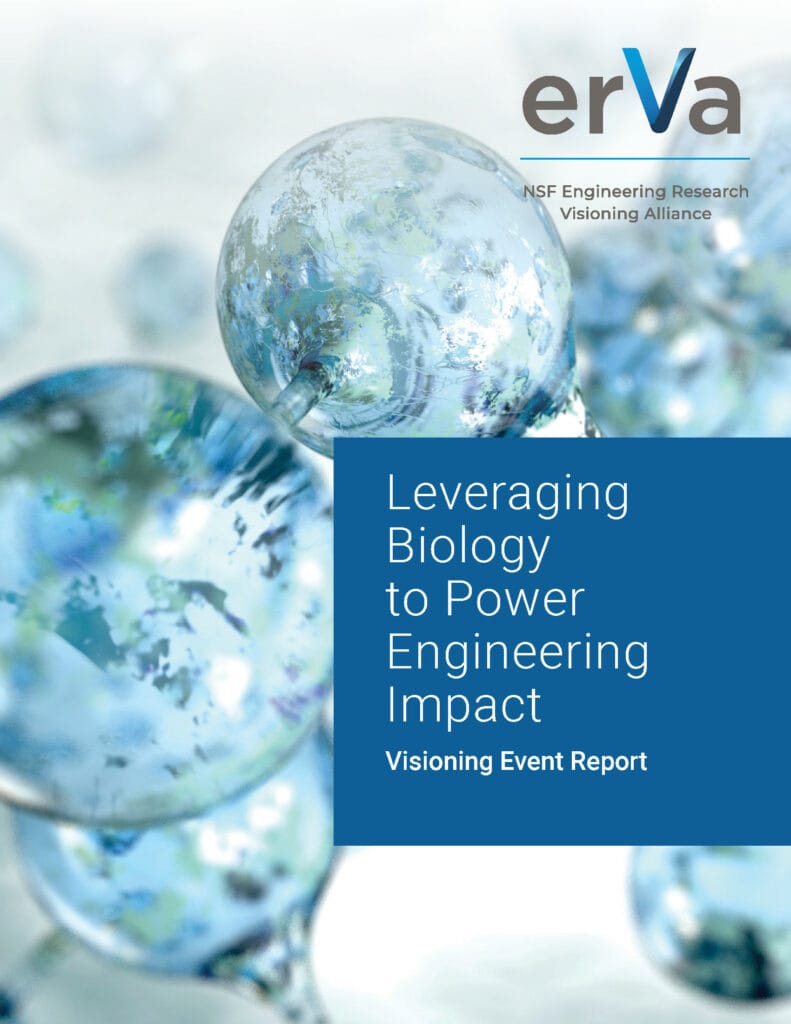Engineering Research Visioning Alliance’s (ERVA’s) latest report lays the groundwork for future discoveries leveraging biology for engineering impact
Nov. 17, 2022 – The Engineering Research Visioning Alliance (ERVA), a U.S. National Science Foundation-funded initiative, released a report today identifying engineering research priorities that merge breakthroughs in biology with engineering. To envision a future with solutions for improved mobility, health, and other societal benefits, the report uses “8 Impossible Things” as ideal scenarios that may become possible through engineering research. Each “impossible thing” is a future vision positively impacted through bold new research—and subsequent innovation—at the intersection of biology and engineering. The executive summary and full report, Leveraging Biology to Power Engineering Impact, can be found downloaded here.
Dozens of engineering research priorities are outlined in the report, which casts the findings of the visioning event within the framework of three research domains, bio-inspired/informed, repurposing biology, and improving on biology. Three common threads were identified: (1) sustainable solutions that involve repurposed or recycled materials, (2) inclusive design and research to serve all populations equitably, and (3) affordable approaches that ultimately provide low-cost solutions.
“While they are separate disciplines, the convergence of biology and engineering has enormous potential to solve some of our greatest problems,” said Cato Laurencin, University Professor and Albert and Wilda Van Dusen Distinguished Endowed Professor of Orthopaedic Surgery at the University of Connecticut and co-lead of the visioning event. “Collaboration in research will allow for the scientific community to come together and explore solutions to some of the biggest problems facing our world today.”
The “8 Impossible Things” were presented to more than 100 leading researchers in industry, academia, and the public sector. Experts and practitioners were tasked with identifying nascent opportunities and priorities for engineering-led, innovative, high-impact research that addresses global and societal needs. A thematic task force developed these “8 Impossible Things” to kick-start thinking about research ideas that could make possible a future in which:
- Smartphones don’t need a trade-in; they’ll reproduce
- A businesswoman flies to work using her new exoskeleton
- Your bathroom mirror performs hospital-grade diagnostics
- There’s never another "your child has been exposed to..." sign at daycare
- Any-town USA manufactures all the chemicals and materials it needs from plants grown nearby
- Lifespans are no longer defined by ZIP code
- Central NYC residents breathe pristine mountain air
- A 100-year-old breaks the 100-meter sprint record
“The University of Delaware’s College of Engineering has a long history of creative and impactful innovation,” said Levi Thompson, ERVA visioning event co-host, dean, and Elizabeth Inez Professor of Chemical Engineering in UD’s College of Engineering. “Research-intensive universities have a special responsibility to focus on practical outcomes that make a difference for people and the environment. By assembling some of the brightest minds in engineering and science, we were able to recommend exciting paths to make the impossible possible.”
Leveraging Biology to Power Engineering Impact is the second report released in 2022 by ERVA, a five-year initiative funded through a cooperative agreement with NSF to help identify future engineering research directions. To read the report, click here. ERVA is funded by a grant from the National Science Foundation.
About The Engineering Research Vision Alliance (ERVA)
The Engineering Research Visioning Alliance (ERVA) is a neutral convener that helps define future engineering research directions. Funded by the NSF Directorate for Engineering, ERVA is a diverse, inclusive and engaged partnership that enables an array of voices to impact national research priorities. The five-year initiative convenes, catalyzes and enables the engineering community to identify nascent opportunities and priorities for engineering-led innovative, high-impact, cross-domain research that addresses national, global and societal needs. Learn more at www.ERVAcommunity.org.
